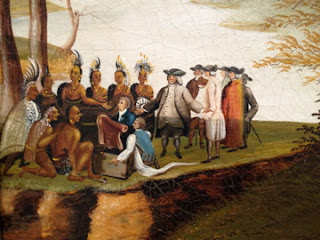
中国语文 only
WeChat Link here
Americans have a taste for drama. With every change of political party the Manichean struggle between the forces of light and those of darkness appears ready for the final confrontation. And yet it is a society in which the forces of light are also dark, and those of darkness shed light. The Manichean quality of American discourse is most sharply drawn at those moments of political transition from one aggregation of forces to the other. And yet, both oppositional forces--as much as they despise the other--tend to draw from the same well, and feed on the same founding vision--even if to opposite effect. And that well, that source--the Jewish and Christian Bibles (I refrain from the more judgemental appellations Old and New Testaments)--remains very much source of guidance in times of trouble in the United States. Nowhere is this more apparent than in the inaugural speeches of Presidents, especially those who appear to incarnate a clear triumph of one vision (if only narrowly triumphant as is customary within the legal structures under which American politics is managed) over the other.
Eight years ago, in similar circumstances of triumph and chagrin, I noted
Recourse to its insights, molded to the tastes of the speaker, have
been a hallmark of political speech since the founding of the Republic,
especially on the cusp of revolutionary times. And indeed, the
manipulative symbolism that marked the event—the focus on Lincoln as
multilayered mother to her offspring birthed by and now liberated from
her emancipatory womb, and as great protector of the family in time of
crisis threatening the foundation of the family (the American
Republic)—was much in evidence, from the use of the Lincoln Bible to the
rhetorical form of the construction of the speech. The parallels
between 1861 and 2009, and the line from the mother of emancipation to
the graduation ceremony of his offspring, now come to power, was
inescapable.
President Lincoln had a preference for the
Evangelists. President Obama chose Paul, that great Jewish architect of
Christianity. That choice—a reverie on the virtues of the
charity and love of a man (and I mean to use this word in its fully
gendered sense) for his family and of this nation for its global
charge—suggest the character of an administration bent on unity and
dominance within a values structures it, like its predecessor, will hold
out to the world as the universal foundation of political, moral and
social governance. Its essence is Platonic, and consciously so. For
ideologues on the left and right, there is much that serves as a warning
to a complacency grounded in misguided senses of victory or defeat. (
On President Obama's Inauguration Speech)
It was thus with equal interest, and in similar circumstances, in 2017, that I awaited Mr. Trump's Inaugural speech and his selection of the Biblical insight that would mark the presidency of its 45th holder. That selection was announced in the course of President Trump's inaugural address. See Donald J. Trump,
Inaugural Address, January 20, 2017. President Trump chose the Prophets and Psalms. and specifically
Isaiah 42:6,
Jeremiah 31:31-33, and
Psalm 133.
This post reflects on the meaning and fundamental premises reflected in Mr. Trump's Inaugural Speech. It is best read against that of the 44th President, a man who is some ways represents his inverse twin. The full text of Mr. Trump's Speech then follows. For more conventional consensus analysis see
HERE.














